Contents
| « Prev | DORE BIBLE GALLERY, COMPLETE | Next » |
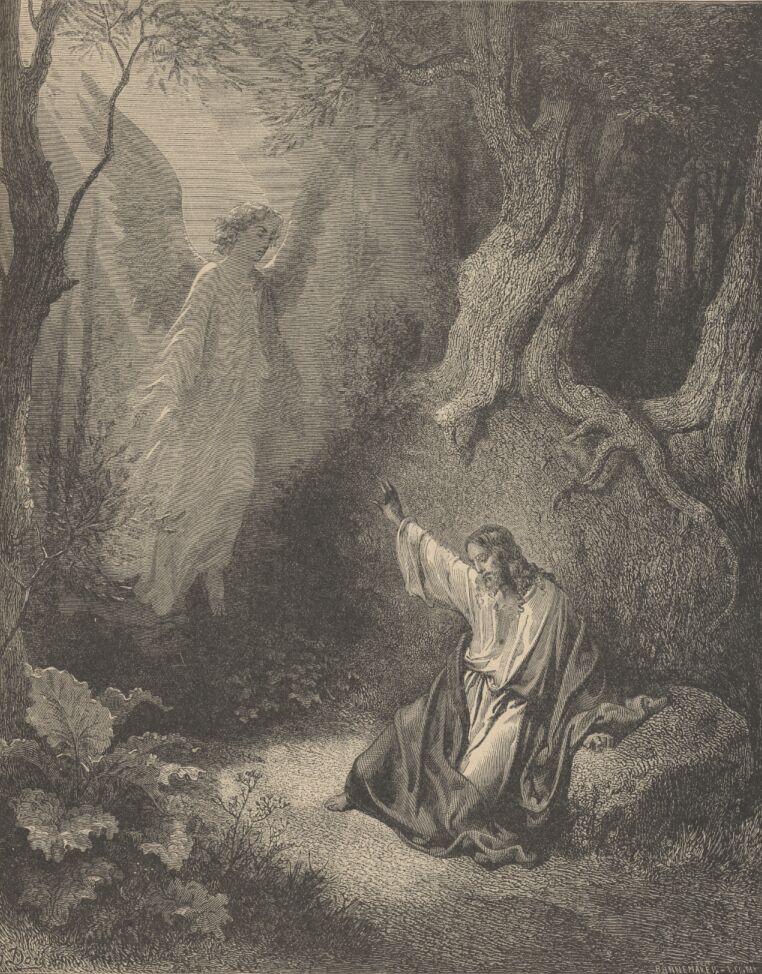
And he came out, and went, as he was wont, to the mount of Olives; and his disciples all followed him. And when he was at the place, he said unto them, Pray that ye enter not in temptation.
And he was withdrawn from them about a stone's cast, and kneeled down, and prayed Saying, Father, if thou be willing, remove this cup from me: nevertheless not my will, but thine, be done.
And there appeared an angel unto him from heaven, strengthening him.
And being in an agony he prayed more earnestly: and his sweat was as it were great drops, of blood falling down to the ground.
And when he rose up from prayer, and was come to his disciples, he found them sleeping for sorrow, and said unto them, Why sleep ye? rise and pray, lest ye enter into temptation—Luke xxii, 39-46.
PRAYER OF, JESUS IN THE GARDEN OF' OLIVES.
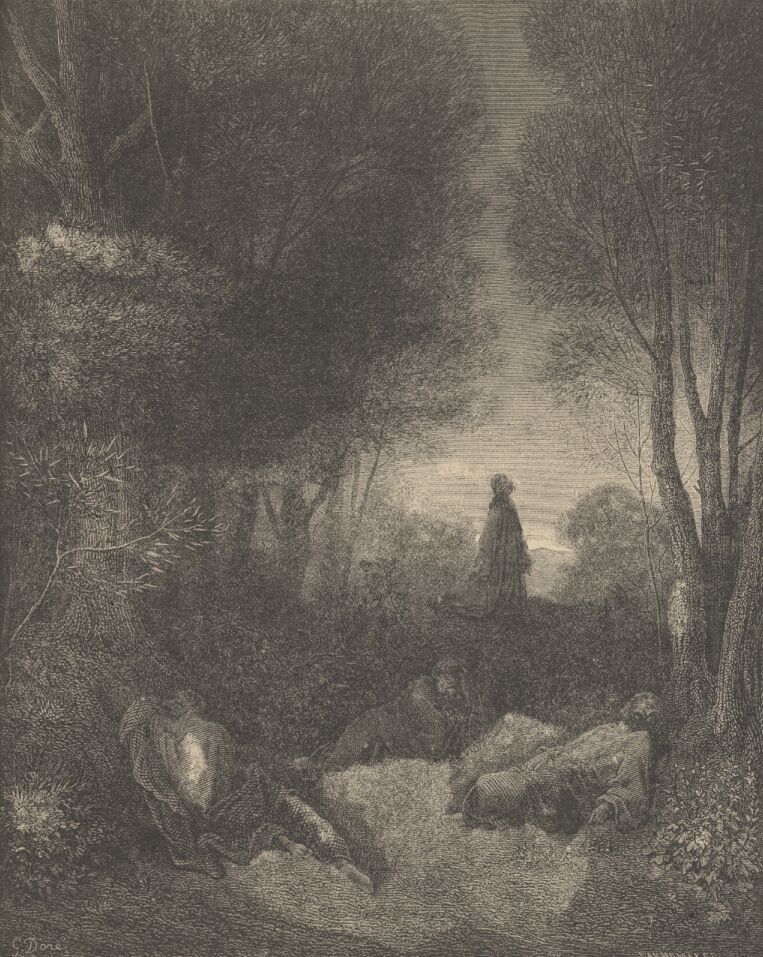
Then cometh Jesus with them unto a place called Gethsemane, and saith unto, the disciples, Sit ye here, while I go and pray yonder. And he took with him Peter and the two sons of Zebedee, and began to be sorrowful and very heavy. Then saith he unto them, My soul is exceeding sorrowful, even unto death: tarry ye here, and watch with me.
And he went a little farther, and fell on his face, and prayed, saying, O my Father, if be possible, let this cup pass from me: nevertheless not as I will, but as thou wilt.
And he cometh unto the disciples, and findeth them asleep, and saith unto Peter, What, could ye not watch with me one hour? Watch and pray, that ye enter not into temptation the spirit indeed is willing, but the flesh is weak.
He went away again the second time, and prayed, saying, O my Father, if this cup may not pass away from me, except I drink it, thy will be done.
And he came and found them asleep again: for their eyes were heavy.
And he left them, and went away again, and prayed the third time, saying the same words.
Then cometh he to his disciples, and saith unto them, Sleep on now, and take your rest behold, the hour is at hand, and the Son of man is betrayed into the hands of sinners. Rise let us be going: behold, he is at hand that doth betray me. Matthew xxvi, 36-46
THE BETRAYAL.
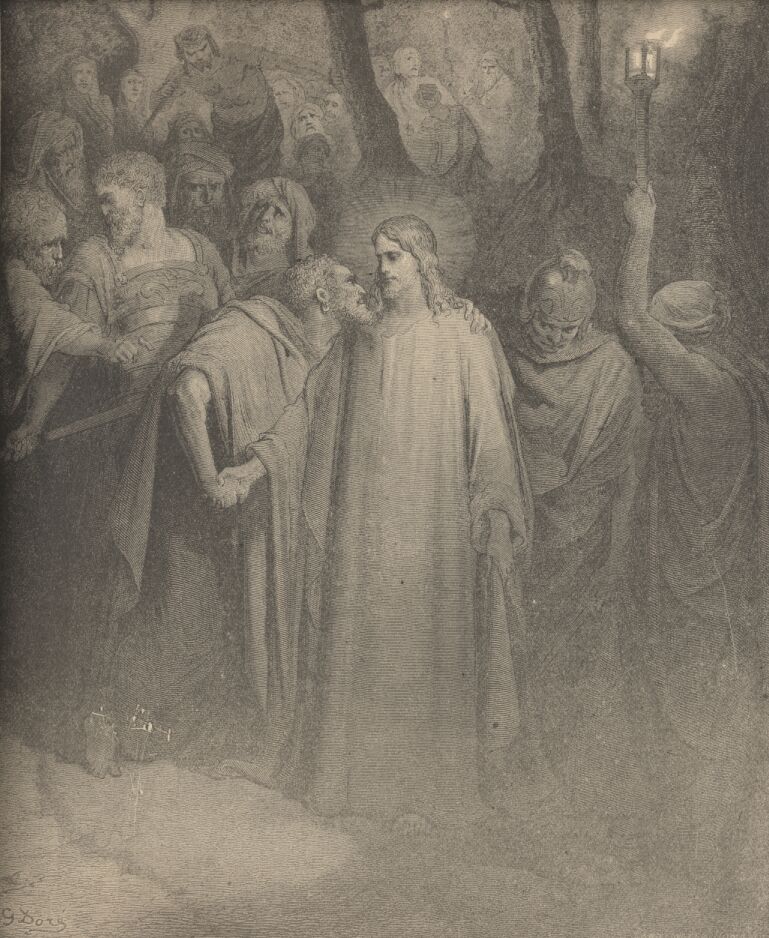
And he cometh the third time, and saith unto them, Sleep on now, and take your rest it is enough, the hour is come; behold, the Son of man is betrayed into the hands of sinners. Rise up, let us go; lo, he that betrayeth me is at hand.
And immediately, while he yet spake, cometh Judas, one of the twelve, and with him great multitude with swords and staves, from the chief priests and the scribes and the elders. And he that betrayed him had given them a token, saying, Whomsoever I shall kiss, that same is he; take him, and lead him away safely. And as soon as he was come, he goeth straight way to him, and saith, Master, master; and kissed him.
And they laid their hands on him, and took him. And one of them that stood by drew a sword, and smote a servant of the high priest, and cut off his ear. And Jesus answered and said unto them, Are ye come out, as against a thief, with swords and with staves to take me? I was daily with you in the temple teaching, and ye took me not but the scriptures must be fulfilled.
And they all forsook him, and fled.—Mark xiv, 41-50.
CHRIST FAINTING UNDER THE CROSS.
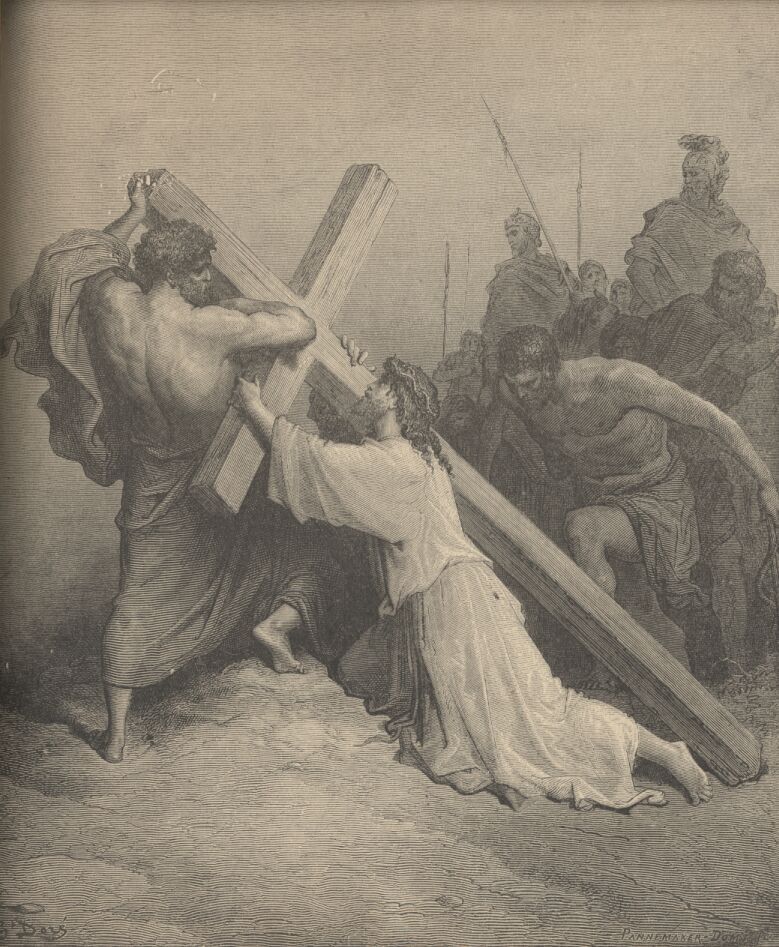
The incident depicted in this illustration seems to be as apocryphal as that embodied in the artist's picture of Mary Magdalene. There is absolutely no warrant in scripture for the notion that Christ fainted under the burden of the cross. The only foundation for such an idea to found in the Bible is contained in the head note to Mark xv, which is quite unwarranted by the text. According to the three synoptic gospels the cross was borne not by Christ, but by Simon, a Cyrenian (see Matthew xxvii, 32; Mark xv, 2 1; Luke xxiii, 26). According to the fourth evangelist, Jesus bore the cross without assistance the whole distance to the place crucifixion (John xix, 16-18). In not one of the four narratives is there so much as a hint that he fainted under the burden.
THE FLAGELLATION.
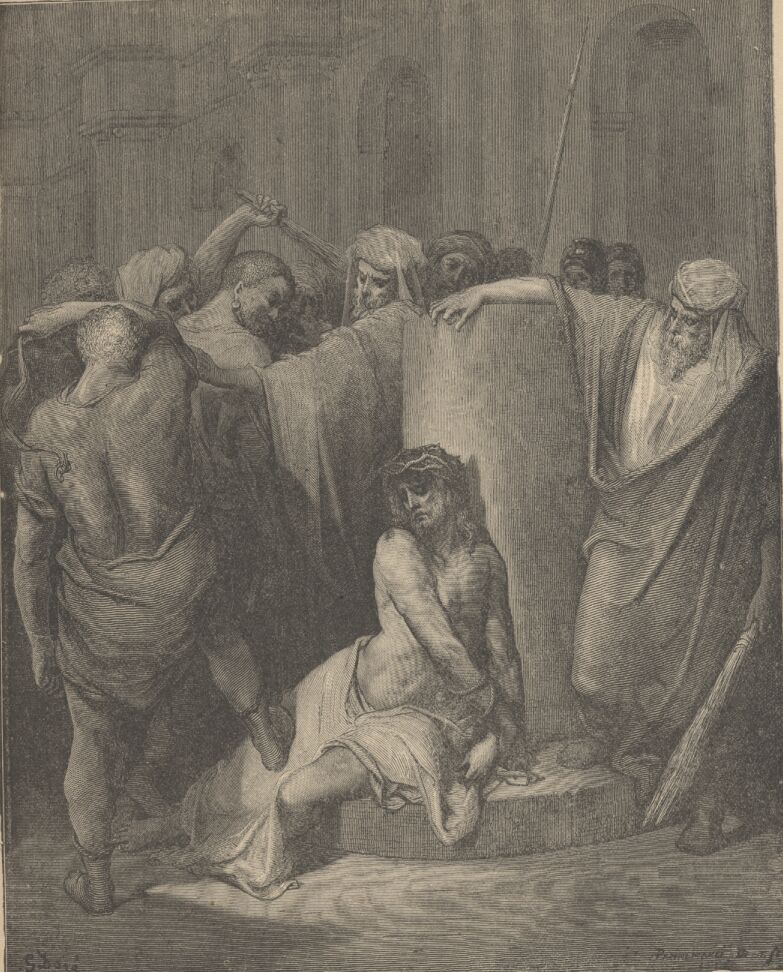
Then released he Barabbas unto them: and when he had scourged Jesus, he deliver him to be crucified.—Matthew xxvii, 26.
And so Pilate, willing to content the people, released Barabbas unto them, and deliver Jesus, when he had scourged him, to be crucified.—Mark xv, 15.
Then Pilate therefore took Jesus, and scourged him. John xix.
THE CRUCIFIXION.
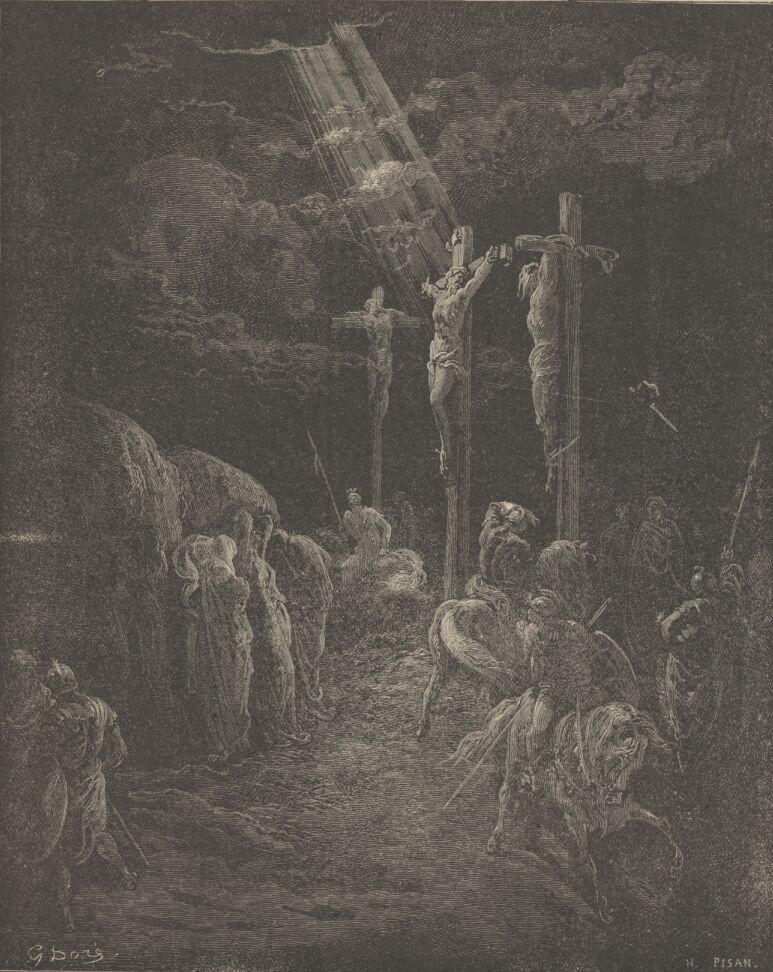
And when they were come unto a place called Golgotha, that is to say, a place of a skull they gave him vinegar to drink mingled with gall: and when he had tasted thereof, he would not drink. And they crucified him, and parted his garments, casting lots: that it might be fulfilled which was spoken by the prophet, They parted my garments among them, and upon my vesture did they cast lots. And sitting down they watched him there; and set up over his head his accusation written, THIS IS JESUS THE KING OF THE JEWS.
Then were there two thieves crucified with him, one on the right hand, and another on the left.
And they that passed by reviled him, wagging their heads, and saying, Thou that destroyest the temple, and buildest it in three days, save thyself. If thou be the Son of God come down from the cross.
Likewise also the chief priests mocking him, with the scribes and elders, said, He saved others: himself he cannot save. If he be the King of Israel, let him now come down from the cross, and we will believe him. He trusted in God; let him deliver him now, if he will have him: for he said, I am the Son of God.
The thieves also, which were crucified with him, cast the same in his teeth.—Matthew xxvii, 33-44.
CLOSE OF THE CRUCIFIXION.
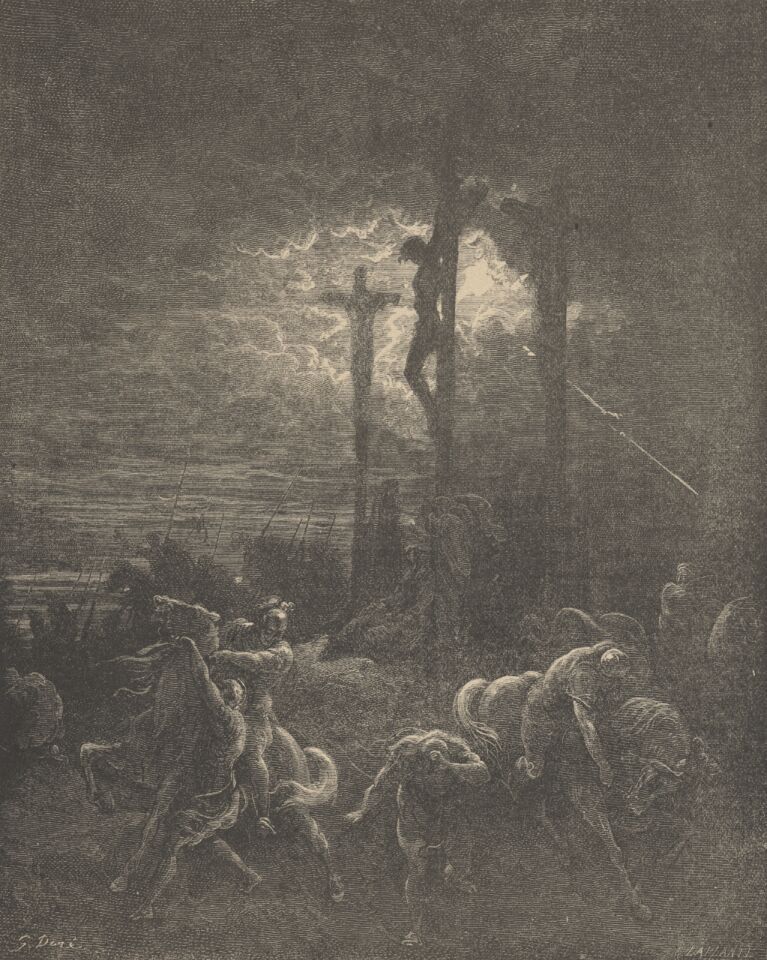
Now from the sixth hour there was darkness over all the land unto the ninth hour. And about the ninth hour Jesus cried with a loud voice, saying, Eli, Eli, lama sabachthani? that is to say, My God, my God, why hast thou forsaken me?
Some of them that stood there, when they heard that, said, This man calleth for Elias. And straightway one of them ran, and took a sponge, and filled it with vinegar, and put it on a reed, and gave him to drink. The rest said, Let be, let us see whether Elias will come to save him.
Jesus, when he had cried again with a loud voice, yielded up the ghost.
And, behold, the veil of the temple was rent in twain from the top to the bottom; and the earth did quake, and the rocks rent; and the graves were opened; and many bodies of the saints which slept arose, and came out of the graves after his resurrection, and went into the holy city, and appeared unto many.
Now when the centurion, and they that were with him, watching Jesus, saw the earthquake, and those things that were done, they feared greatly, saying, Truly this was the Son of God.
And many women were there beholding afar off, which followed Jesus from Galilee, ministering unto him: among which was Mary Magdalene, and Mary the mother of James and Joses, and the mother of Zebedee's children.—Matthew xxvii, 45-56.
THE BURIAL OF JESUS.
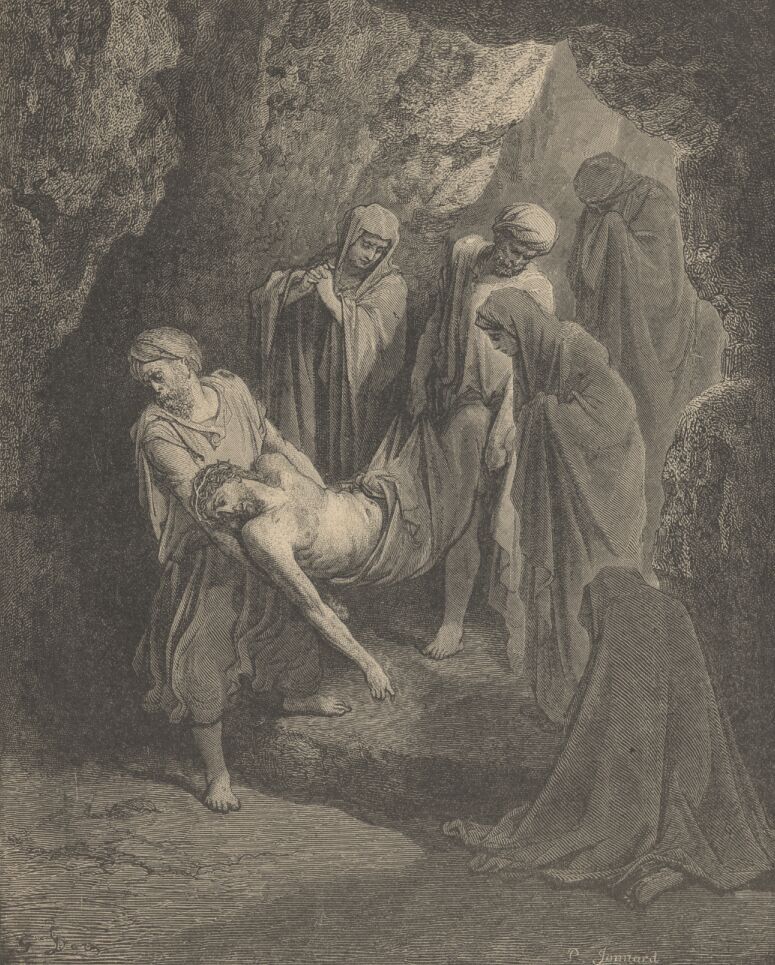
When the even was come, there came a rich man of Arimathea, named Joseph, who also himself was Jesus' disciple he went to Pilate, and begged the body of Jesus. Then Pilate commanded the body to be delivered. And when Joseph had taken the body, he wrapped it in a clean linen cloth, and laid it in his own new tomb, which he had hewn out in the rock: and he rolled a great stone to the door of the sepulchre, and departed.
And there was Mary Magdalene, and the other Mary, sitting over against the sepulchre.—Matthew xxvii, 57-61
THE ANGEL AT THE SEPULCHRE.
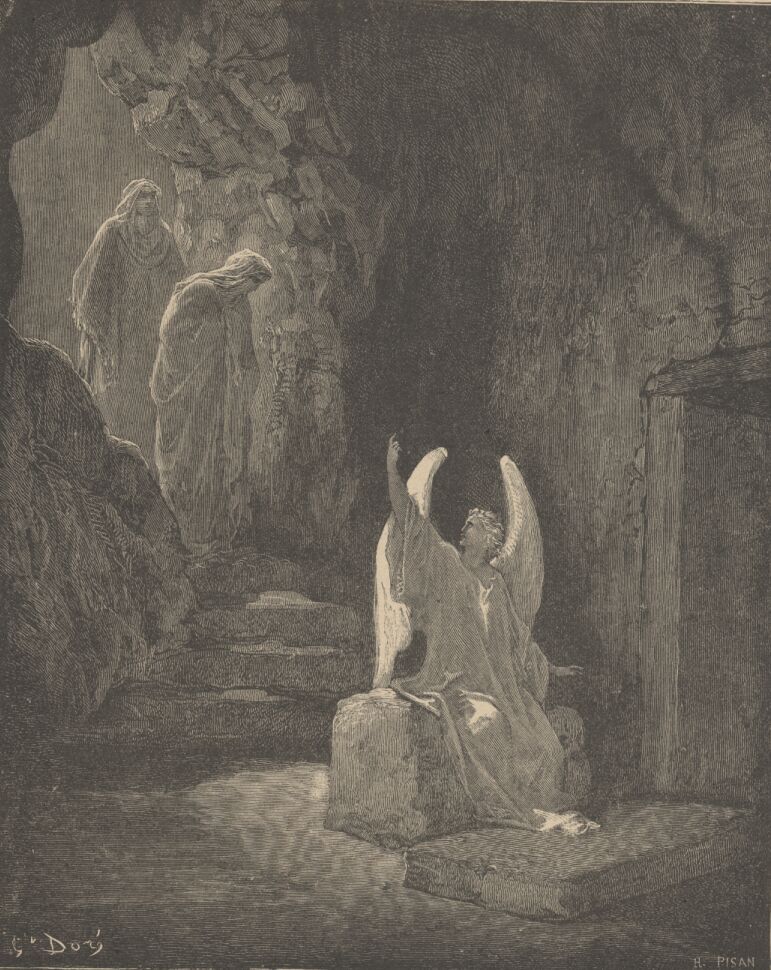
In the end of the sabbath, as it began to dawn toward the first day of the week, came Mary Magdalene and the other Mary to see the sepulchre.
And, behold, there was a great earthquake: for the angel of the Lord descended from, heaven, and came and rolled back the stone from the door, and sat upon it. His countenance was like lightning, and his raiment white as snow: and for fear of him the keepers did shake, and became as dead men.
And the angel answered and said unto the women, Fear not ye: for I know that ye seek Jesus, which was crucified. He is not here: for he is risen, as he said. Come, see the place where the Lord lay. And go quickly, and tell his disciples that he is risen from the dead and, behold, he goeth before you into Galilee; there shall ye see him: lo, I have told you.
And they departed quickly from the sepulchre with fear and great joy; and did run to bring his disciples word.—Matthew xxviii, 1-8.
THE JOURNEY TO EMMAUS.
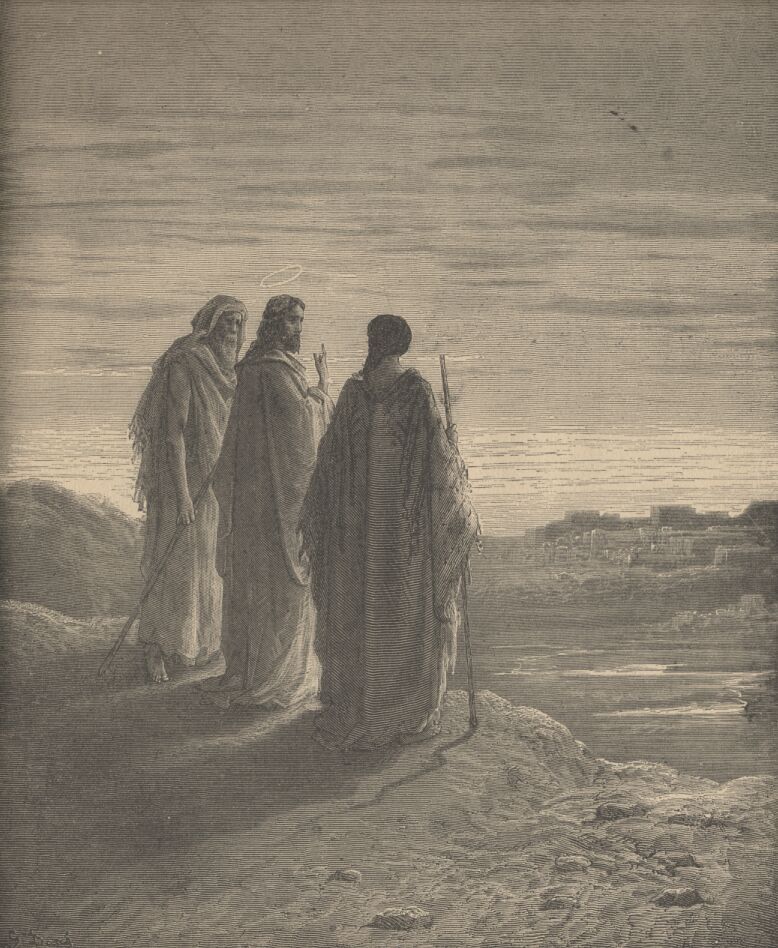
And, behold, two of them went that same day to a village called Emmaus which was from Jerusalem about threescore furlongs.
And they talked together of all these things which had happened. And it came to pass that, while they communed together and reasoned, Jesus himself drew near and went with them. But their eyes were holden that they should not know him.
And he said unto them, What manner of communications are these that ye have one to another, as ye walk, and are sad?
And the one of them, whose, name was Cleopas, answering said unto him, Art thou only a stranger in Jerusalem, and hast not known the things which are come to pass there in these days?
And he said unto them, What things?
And they said unto him, Concerning Jesus of Nazareth, which was a prophet mighty in deed and word before God and all the people: And how the chief priests and our rulers delivered him to be condemned to death, and have crucified him. But we trusted that it had been he which should have redeemed Israel: and beside all this, to-day is the third day since these things were done. Yea, and certain women also of our company made us astonished, which were early at the sepulchre; and when they found not his body, they came, saying, that they had also seen a vision of angels, which said that he was alive. And certain of them which were with us went to the sepulchre, and found it even so as the women had said: but him they saw not.
Then he said unto them, O fools, and slow of heart to believe all that the prophets have spoken: ought not Christ to have suffered these things, and to enter into his glory?
And beginning at Moses and all the prophets, he expounded unto them in all the scriptures the things concerning himself.
And they drew nigh unto the village, whither they went: and he made as though he would have gone further. But they constrained him, saying, Abide with us: for it is toward evening, and the day is far spent. And he went in to tarry with them.
And it came to pass, as he sat at meat with them, he took bread, and blessed it, and brake, and gave to them. And their eyes were opened, and they knew him; and he vanished out of their sight.
And they said one to another, Did not our heart burn within us, while he talked with us by the way, and while he opened to us the scriptures?
And they rose up the same hour, and returned to Jerusalem, and found the eleven gathered together, and them that were with them, saying, The Lord is risen indeed, and hath appeared to Simon.
And they told what things were done in the way, and how he was known of them in breaking of bread.—Luke xxiv, 13-35.
THE ASCENSION.
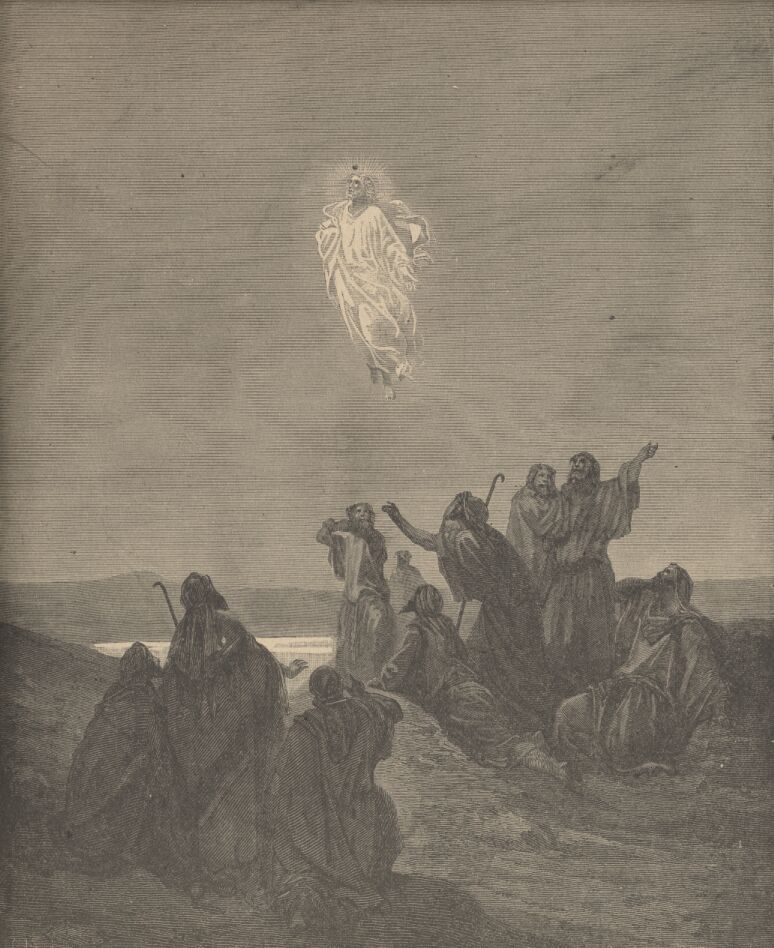
Now upon the first day of the week, very early in the morning, they came unto the sepulchre, bringing the spices which they had prepared, and certain others with them. And they found the stone rolled away from the sepulchre.
And they remembered his words. And returned from the sepulchre, and told all these things unto the eleven, and to all the rest. * * *
And, behold, two of them went that same day to a village called Emmaus, which was from Jerusalem about threescore furlongs. And they talked together of all these things which had happened. * * *
And they rose up the same hour, and returned to Jerusalem, and found the eleven gathered together, and them that were with them, saying, The Lord is risen indeed, and hath appeared to Simon. And they told what things were done in the way, and how he was known of them in breaking of bread. And as they thus spake, Jesus himself stood in the midst of them, and saith unto them, Peace be unto you. * * *
And, behold, I send the promise of my Father upon you: but tarry ye in the city of Jerusalem, until ye be endued with power from on high.
And he led them out as far as to Bethany, and he lifted up his hands, and blessed them. And it came to pass, while he blessed them, he was parted from them, and carried up into heaven. And they worshiped him, and returned to Jerusalem with great joy. Luke xxiv, 1-2, 8-9, 13-14, 33-36, 49-52.
The former treatise have I made, O Theophilus, of all that Jesus began both to do and teach, until the day in which he was taken up, after that he through the Holy Ghost had given commandments unto the apostles whom he had chosen: to whom also he shewed himself alive after his passion by many infallible proofs, being seen of them forty days, and speaking of the things pertaining to the kingdom of God: and, being assembled together with them, commanded them that they should not depart from Jerusalem, but, wait for the promise of the Father, which, saith he, ye have heard of me. For John truly baptized with water; but ye shall be baptized with the Holy Ghost not many days hence.
When they therefore were come together, they asked of him, saying, Lord, wilt thou at this time restore again the kingdom of Israel? And he said unto them, It is not for you to know the times or the seasons, which the Father hath put in his own power. But ye shall receive power, after that the Holy Ghost is come upon you: and ye shall be witnesses unto me both in Jerusalem, and all Judaea, and in Samaria, and unto the uttermost part of the earth.
And when he had spoken these things, while they beheld, he was taken up: and a cloud received him out of their sight. And while they looked steadfastly toward heaven as he went up, behold, two men stood by them in white apparel.—Acts i, 1-10
THE MARTYRDOM OF ST. STEPHEN.
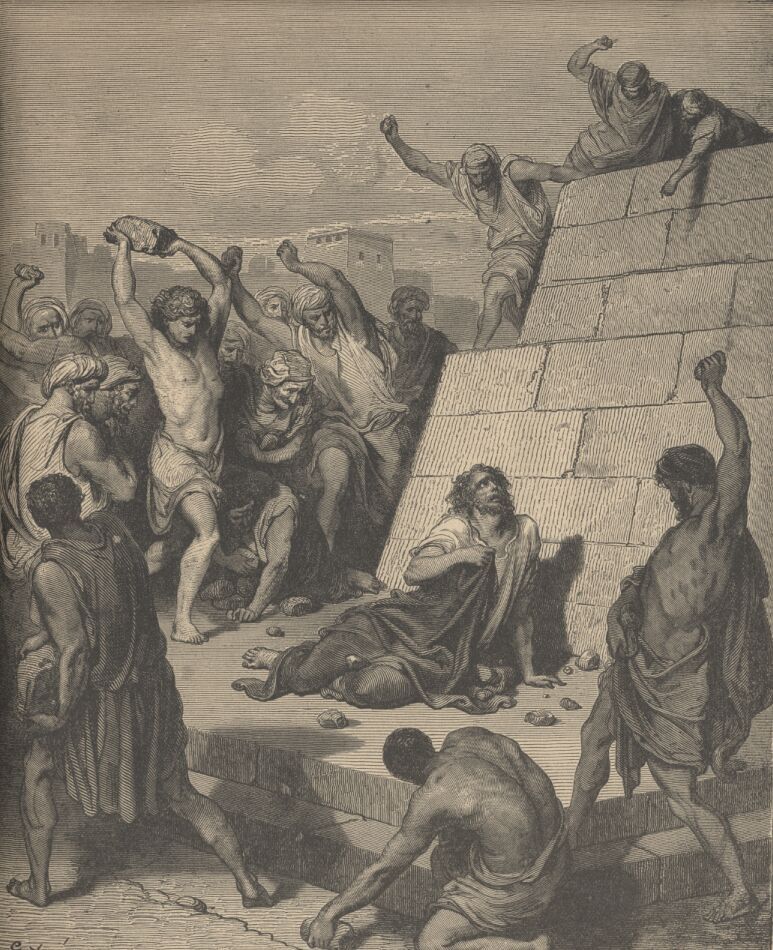
And Stephen, full of faith and power, did great wonders and miracles among the people.
Then there arose certain of the synagogue, which is called the synagogue of the Libertines, and Cyrenians, and Alexandrians, and of them of Cilicia and of Asia, disputing with Stephen. And they were not able to resist the wisdom and the spirit by which he spake. Then they suborned men, which said, We have heard him speak blasphemous words against Moses and against God. And they stirred up the people, and the elders, and the scribes, and came upon him, and caught him, and brought him to the council. And set up false witnesses, which said, This man ceaseth not to speak blasphemous words against this holy place, and the law: for we have heard him say, that this Jesus of Nazareth shall destroy this place, and shall change the customs which Moses delivered us.
And all that sat in the council, looking steadfastly on him, saw his face as it had been the face of an angel.
Then said the high priest, Are these things so?
And he said, Men, brethren, and fathers, hearken: [Stephen here makes his defense, concluding with a terrible, denunciation of the Jews as being stiffnecked and persecutors of their prophets, and as betrayers and murderers of Jesus Christ.]
When they heard these things, they were cut to the heart, and they, gnashed on him with their teeth.
But he, being full of the Holy Ghost, looked up steadfastly into heaven, and saw the glory of God, and Jesus standing on the right hand of God, and said, Behold, I see the heavens opened, and the Son of man standing on the right hand of God.
Then they cried out with a loud voice, and stopped their ears, and ran upon him with one accord, and cast him out of, the city, and stoned him: and the witnesses laid down their clothes at a young man's feet, whose name was Saul. And they stoned Stephen, calling upon God, and saying, Lord Jesus, receive my spirit.
And he kneeled down, and cried with a loud voice, Lord, lay not this sin to their charge. And when he had said this, he fell asleep.
And Saul was consenting unto his death.—Acts vi, 8-15; vii, 1-2, 54-56; viii, 1.
SAUL'S CONVERSION.
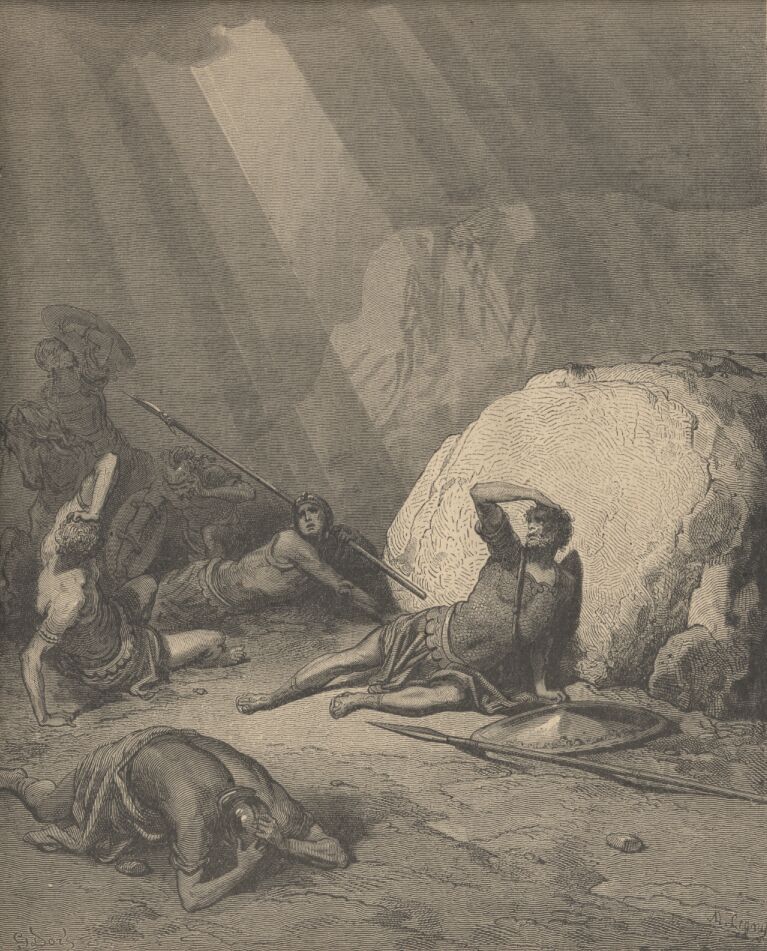
And Saul, yet breathing out threatenings and slaughter against the disciples of the Lord, went unto the high priest, and desired of him letters to Damascus to the synagogues, that if he found any of this way, whether they were men or women, he might bring them bound unto Jerusalem.
And as he journeyed, he came near Damascus: and suddenly there shined round about him a light from heaven: and he fell to the earth, and heard a voice, saying unto him, Saul, Saul, why persecutest thou me? And he said, Who art thou, Lord? And the Lord said, I am Jesus whom thou persecutest it is hard for thee to kick against the pricks. And he trembling and astonished said, Lord, what wilt thou have me to do? And the Lord said unto him, Arise, and go into the city, and it shall be told thee what thou must do.
And the men which journeyed with him stood speechless, hearing a voice, but seeing no man.
And Saul arose from the earth; and when his eyes were opened, he saw no man: but they led him by the hand, and brought him into Damascus. And he was three days without sight, and neither did eat nor drink.
And there was a certain disciple at Damascus, named Ananias; and to him said the Lord in a vision, Ananias. And he said, Behold, I am here, Lord.
And the Lord said unto him, Arise, and go into the street which is called Straight, and enquire in the house of Judas for one called Saul, of Tarsus: for, behold, he prayeth, and hath seen in a vision a man named Ananias coming in, and putting his hand on him, that he might receive his sight. Then Ananias answered, Lord, I have heard by many of this man, how much evil he hath done to thy saints at Jerusalem: and here he hath authority from the chief priests to bind all that call on thy name. But the Lord said unto him, Go thy way: for he is a chosen vessel unto me, to bear my name before the Gentiles, and kings, and the children of Israel: for I will shew him how great things he must suffer for my name's sake.
And Ananias went his way, and entered into the house; and putting his hands on him said, Brother Saul, the Lord, even Jesus, that appeared unto thee in the way as thou camest, hash sent me, that thou mightest receive thy sight, and be filled with the Holy Ghost. And immediately there fell from his eyes as it had been scales: and he received sight forthwith, and arose and was baptized. And when he had received meat, he was strengthened.
Then was Saul certain days with the disciples which were at Damascus. And straightway he preached Christ in the synagogues, that he is the Son of God.—Acts ix, 1-20.
THE DELIVERANCE OF ST. PETER.
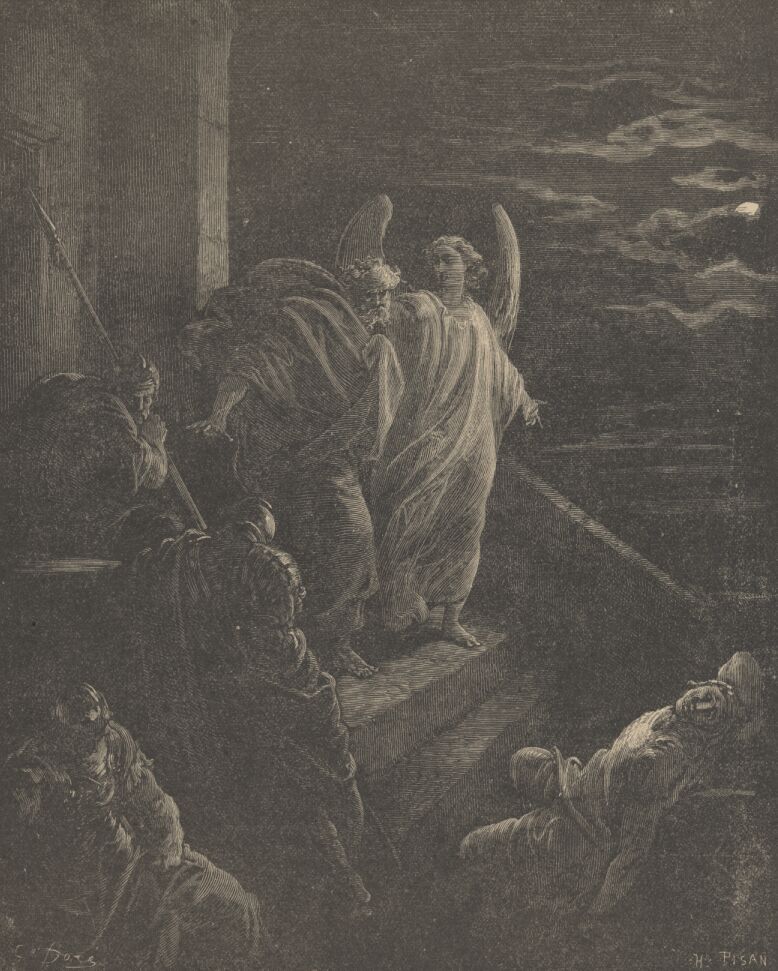
Now about that time Herod the king stretched forth his hands to vex certain of the church. And he killed James the brother of John with the sword.
And because he saw it pleased the Jews, he proceeded further to take Peter also. (Then were the days of unleavened bread.) And when he had apprehended him, he put him in prison, and delivered him to four quarternions of soldiers to keep him; intending after Easter to bring him forth to the people.
Peter therefore was kept in prison: but prayer was made without ceasing of the church unto God for him.
And when Herod would have brought him forth, the same night Peter was sleeping between two soldiers, bound with two chains: and the keepers before the door kept the prison. And, behold, the angel of the Lord came upon him, and a light shined in the prison: and he smote Peter on the side, and raised him up, saying, Arise up quickly. And his chains fell off from his hands. And the angel said unto him, Gird thyself, and bind on thy sandals: And so he did. And he saith unto him, Cast thy garment about thee, and follow me. And he went out, and followed him; and wist not that it was true which was done by the angel but thought he saw a vision. When they were past the first and the second ward, they came unto the iron gate that leadeth unto the city; which opened to them of his own accord and they went out and passed on through one street and forthwith the angel departed from him.
And when Peter was come to himself, he said, Now I know of a surety, that the Lord hath sent his angel, and hath delivered me out of the hand of Herod, and from all the expectation of the people of the Jews.—Acts xii, 1-11
PAUL AT EPHESUS.
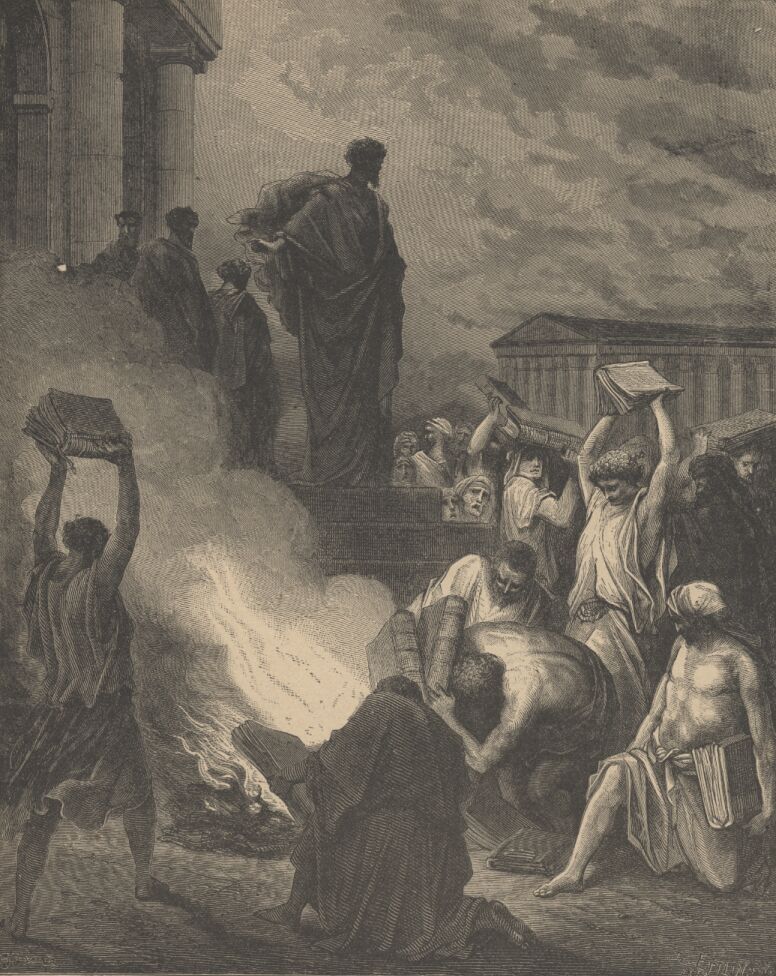
And it came to pass, that, while Apollos was at Corinth, Paul having passed through the upper coasts came to Ephesus; and finding certain disciples, he said unto them, Have ye, received the Holy Ghost since ye believed? And they said unto him, We have not so much as heard whether there be any Holy Ghost. And he, said unto them, Unto what then were ye baptized? And they said, Unto John's baptism. Then said Paul, John verily baptized with the baptism of repentance, saying unto the people, that they should believe on him which should come after him, that is, on Christ Jesus.
When they heard this, they were baptized in the name of the Lord Jesus. And when Paul had laid his hands upon them, the Holy Ghost came on them; and they spake with tongues, and prophesied. And all the men were about twelve.
And he went into the synagogue, and spake boldly for the space of three months, disputing and persuading the things concerning the kingdom of God.
But when divers were hardened, and believed not, but spake evil of that way before the multitude, he departed from them, and separated the disciples, disputing daily in the school of one Tyrannus. And this continued by the space of two years; so that all they which dwelt in Asia heard the word of the Lord Jesus, both Jews and Greeks.
And God wrought special miracles by the hands of Paul: so that from his body were brought unto the sick handkerchiefs or aprons, and the diseases departed from them, and the evil spirits went out of them.
Then certain of the vagabond Jews, exorcists, took upon them to call over them which had evil spirits the name of the Lord Jesus, saying, We adjure you by Jesus whom Paul preacheth. And there were seven sons of one Sceva, a Jew, and chief of the priests, which did so. And the evil spirit answered and said, Jesus I know, and Paul I know; but who are ye? And the man in whom the evil spirit was leaped on them, and overcame them, and prevailed against them, so that they fled out of that house naked and wounded.
And this was known to all the Jews and Greeks also dwelling at Ephesus; and fear fell on them all, and the name of the Lord Jesus was magnified. And many that believed came, and confessed, and shewed their deeds. Many of them also which used curious arts brought their books together, and burned them before all men: and they counted the price of them, and found it fifty thousand pieces of silver.
So mightily grew the word of God and prevailed.—Acts xix, 1-20.
PAUL MENACED BY THE JEWS.
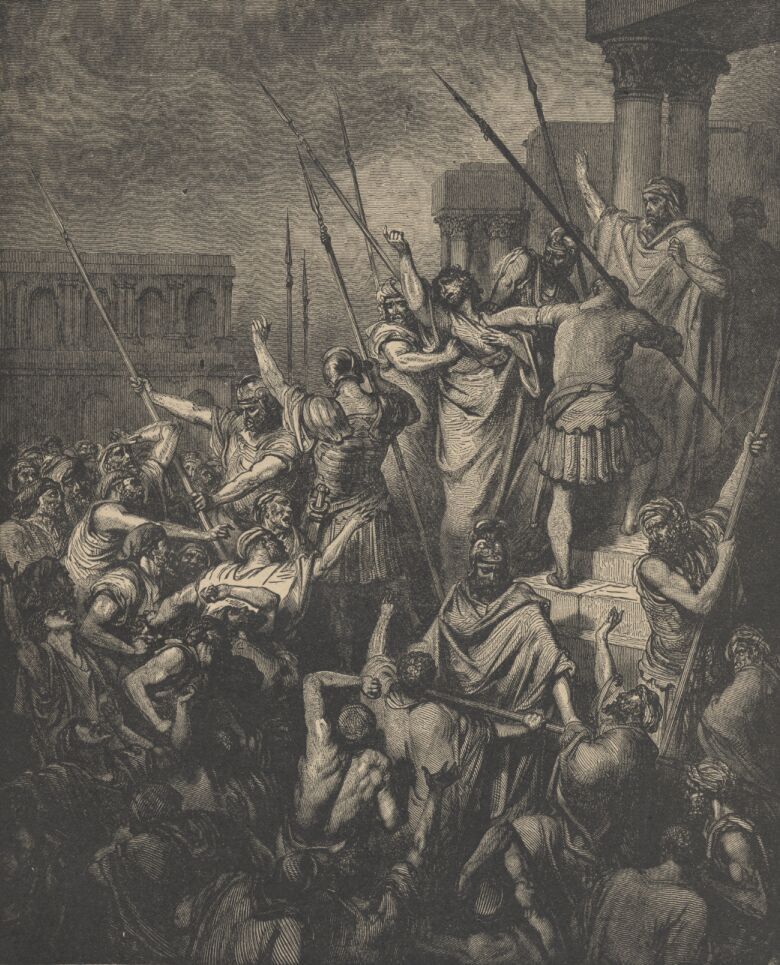
Do therefore this that we say to thee: We have four men which have a vow on them; them take, and purify thyself with them, and be at charges with them, that they may shave their heads: and all may know that those things, whereof they were informed concerning thee, are nothing; but that thou thyself also walkest orderly, and keepest the law.
Then Paul took the men, and the next day purifying himself with them entered into the temple, to signify the accomplishment of the days of purification, until that an offering should be offered for every one of them.
And when the seven days were almost ended, the Jews which were of Asia, when they saw him in the temple, stirred up all the people, and laid hands on him, crying out, Men of Israel, help: this is the man, that teacheth all men every where against the people, and the law, and this place: and further brought Greeks also into the temple, and hath polluted this holy place. (For they had seen before with him in the city Trophimus an Ephesian, whom they supposed that Paul had brought into the temple.)
And all the city was moved, and the people ran together: and they took Paul, and drew him out of the temple: and forthwith the doors were shut. And as they went about to kill him, tidings came unto the chief captain of the band, that all Jerusalem was in an uproar: who immediately took soldiers and centurions, and ran down unto them and when they saw the chief captain and the soldiers, they left beating of Paul. Then the chief captain came near, and took him, and commanded him to be bound with two chains; and demanded who he was, and what he had done. And some cried one thing, some another, among the multitude: and when he could not know the certainty for the tumult, he commanded him to be carried into the castle. And when he came upon the stairs, so it was, that he was borne of the soldiers for the violence of the people. For the multitude of the people followed after, crying, Away with him.
And as Paul was to be led into the castle, he said unto the chief captain, May I speak unto thee? Who said, Canst thou speak Greek? Art not thou that Egyptian, which before these days madest an uproar, and leddest out into the wilderness four thousand men that were murderers? But Paul said, I am a man which am a Jew of Tarsus, a city in Cilicia, a citizen of no mean city: and, I beseech thee, suffer me to speak unto the people.
And when he had given him license, Paul stood on the stairs, and beckoned with the hand unto the people. And when there was made a great silence, he spake unto them in the Hebrew tongue.—Acts xxi, 23-40.
PAUL'S SHIPWRECK.
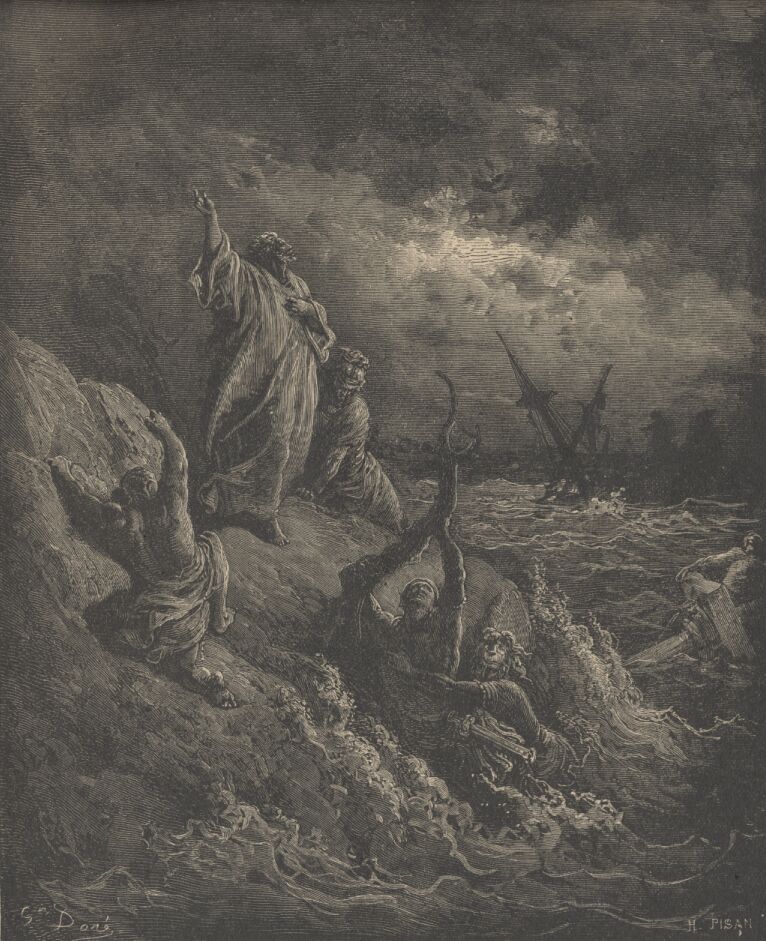
And while the day was coming on, Paul besought them all to take meat, saying, This day is the fourteenth day that ye have tarried and continued fasting, having taken nothing. Wherefore I pray you to take some meat; for this is for your health: for there shall not a hair fall from the head of any of you.
And when he had thus spoken, he took bread, and gave thanks to God in presence of them all; and when he had broken it, he began to eat. Then were they all of good cheer, and they also took some meat.
And we were in all in the ship two hundred threescore and sixteen souls.
And when they had eaten enough, they lightened the ship, and cast out the wheat into the sea. And when it was day, they knew not the land: but they discovered a certain creek with a shore, into the which they were minded, if it were possible, to thrust in the ship. And when they had taken up the anchors, they committed themselves unto the sea, and loosed the rudder bands, and hoised up the mainsail to the wind, and made toward shore. And falling into a place where two seas met, they ran the ship aground; and the forepart stuck fast, and remained unmovable, but the hinder part was broken with the violence of the waves. And the soldiers' counsel was to kill the prisoners, lest any of them should swim out, and escape. But the centurion, willing to save Paul, kept them from their purpose; and commanded that they which could swim should cast themselves first into the sea, and get to land: and the rest, some on boards, and some on broken pieces of the ship. And so it came to pass, that they escaped all safe to land.
And when they were escaped, then they knew that the island was called Melita.
And the barbarous people shewed us no little kindness: for they kindled a fire, and received us every one, because of the present rain, and because of the cold.—Acts xxvii, 33-44; xxviii, 1-2
DEATH ON THE PALE HORSE.
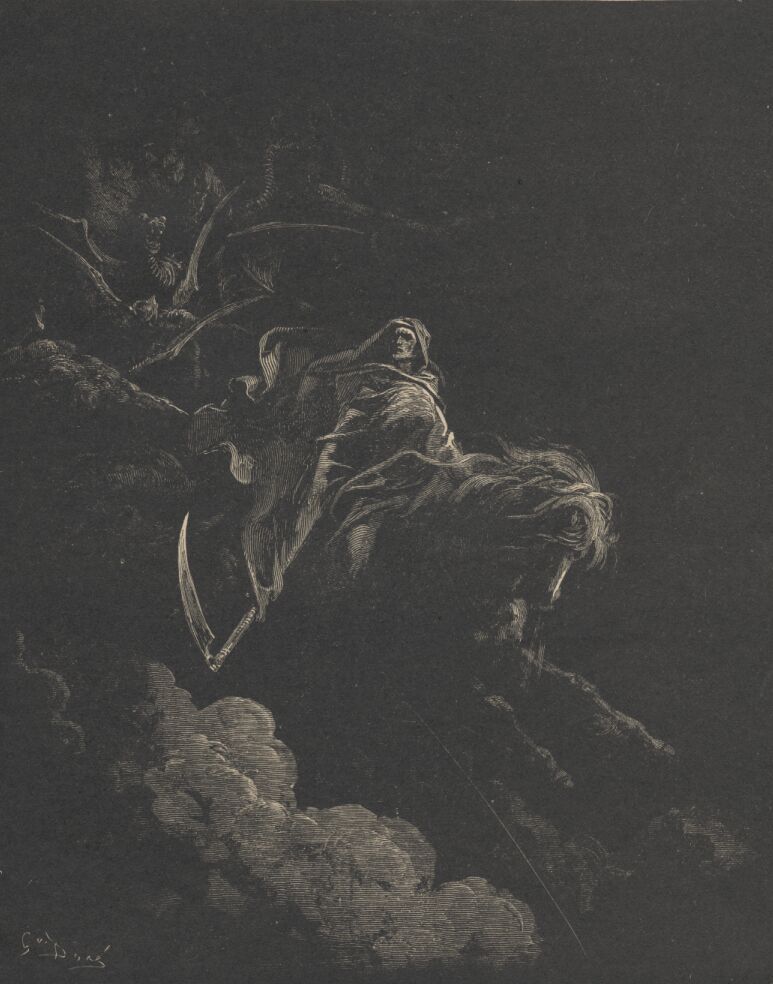
And when he had opened the fourth seal, I heard the voice of the fourth beast say, Come and see.
And I looked, and behold a pale horse: and his name that sat on him was Death, and Hell followed with him. And power was given unto them over the fourth part of the earth, to kill with sword, and with hunger, and with death, and with the beasts of the earth. Revelation vi, 7-8
| « Prev | DORE BIBLE GALLERY, COMPLETE | Next » |